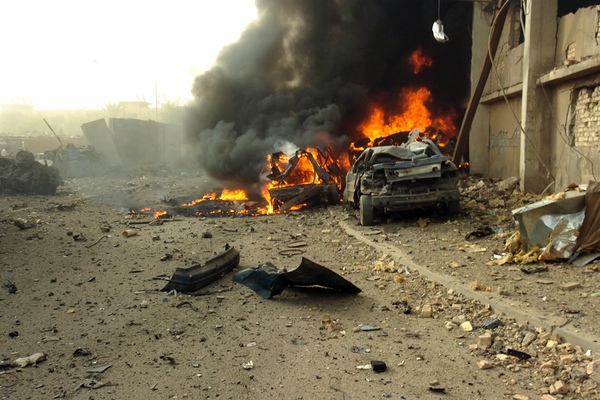What’s Wrong with Calling ISIS Medieval?

It is in vogue today to refer to the acts of the Islamic State (IS or ISIS, as it used to be known before) as Medieval, or taken from the Middle-Ages.
The Daily Express, for instance, in a headline on the 21st of June 2014, warned its readers of "The New Dark Ages: The Chilling Medieval Society ISIS Extremist Seek to Impose in Iraq."
Recently, the International New York Times carried an article entitled, "With Videos of Killings, ISIS Sends Medieval Message by Modern Method." (September 7, 2014)
These are only two examples out of many. Referring to the acts of IS and other Islamic terrorist groups as reminiscent of the Middle-Ages has become quite common in the so-called western media.
The term Medieval denotes a period of time in which society was backward and cruel. The Middle-Ages represents a dark historical landscape far away from the enlightened modern consciousness. Thus, by depicting the terrorist acts carried out by IS as Medieval and the world-view it wishes to impose as belonging to the Middle Ages the media in the democratic world distances IS from the contemporary international setting. IS belongs to a far away period.
Well, it does not. To believe it does is to engage in historical denial.
It is all too facile to attribute the beheading of innocent people in front of TV cameras and a zealous ideology to a distant medieval period.
Acts of brutality and a totalitarian world-view were prevalent to a much greater degree in the 20th century than in the Middle-Ages.
The Middle-Ages knew nothing like Nazi Germany under Adolf Hitler or Communist Russia under Joseph Stalin, even if the huge gaps in technology are taken into consideration. Indeed, the Khmer Rouge in Cambodia carried out acts of unspeakable brutality against its own citizens without having recourse to any advanced technological means to do it. The world-view of Pol Pot, the Khmer Rouge leader, was certainly not more enlightened than that of Abu Bakr al-Bagdhadi, the leader of IS.
Al-Baghdadi's declaration of a Caliphate may be an excuse to justify references to the Middle-Ages in this context. However, a careful reading of the western press, for instance, indicates that the designation has much less to do with the historical connotations of al-Baghdadi's declaration and much more with the image conveyed by the terms Medieval and Middle-Ages. The aim is not to elucidate, but to impress.
To resort to the all-too familiar derogatory terms Middle Ages, Medieval period, Dark Ages in order to describe IS and warn of its nefarious ideology is both historically dubious and intellectually questionable.
There is something enticing about seeing our contemporary world as enlightened compared to a distant period of time in which a primitive, backward, cruel world-view prevailed.
As the 20th century has amply demonstrated, liberal democracies can coexist with totalitarian regimes, enlightened ideas with backward views, order with anarchy and law with cruelty.
The terrorist acts of the 11th of September 2001 were carried out at the very beginning of the 21st century. A hitherto unimaginable scene of fear, destruction and death in the United States occurred as more and more countries in the international system had been embracing democracy.
IS is not the first revolutionary actor in modern history, wishing to destroy the existing international system by force. It is certainly not the first actor espousing a totalitarian ideology, which tolerates no deviation and obliterates all opposition, real or imaginary. It is hardly the first terrorist group to glorify death and take advantage of the sensibilities of fearful audiences and viewers in democratic countries.
There is no need to travel backwards, hundred of years into history to describe IS's brutality or warn us of its sinister world-view. A much shorter journey into history will suffice.